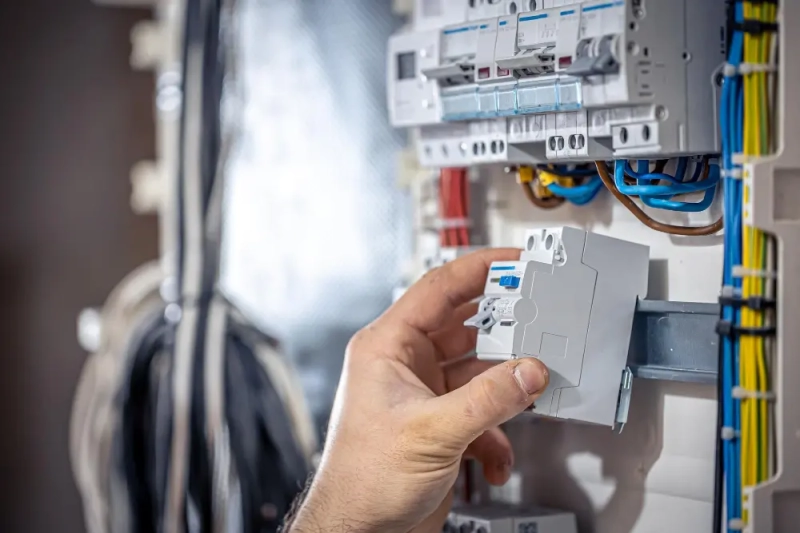
What is a UPS? What are UPS Types?

UPS, or Uninterruptible Power Supply, is a system used to provide continuous energy to devices when electrical power is interrupted. Widely used in many homes and businesses today, UPSs provide protection against power outages and surges. In this article, we will discuss what a UPS is, how it works and the different types of UPS.
What is an Uninterruptible Power Supply (UPS)?
A UPS is a device or system used to provide continuous power to devices in the event of a power outage. The main purpose of a UPS is to prevent data loss or damage due to power outages and fluctuations. A UPS consists of an energy storage unit (usually a battery) and an inverter that transfers energy from this unit to devices.
How Does a UPS Work?
A UPS takes energy from the normal electricity supply and routes it to a battery or other energy storage device. When the power goes out, the UPS quickly kicks in and supplies the stored energy to the devices. This keeps devices running without interruption and prevents data loss. When the power outage is over, the UPS switches back to the normal power supply and starts charging the battery.
Standard UPS
A standard UPS is a basic power supply and is generally suitable for home and small office use. When there is a power outage, it kicks in immediately and provides power to devices. However, the energy storage capacity of this type of UPS can be limited and may not withstand prolonged outages.
Line Interactive UPS
Line Interactive UPS is a type of UPS that can respond better to electrical fluctuations. This type of UPS can stabilize voltage fluctuations and reduce overvoltage. At the same time, it charges the battery under normal conditions and only kicks in when there is a power outage.
Online (Double Conversion) UPS
Online UPS is one of the most reliable and fully protected types of UPS. This type of UPS uses battery power continuously and provides uninterrupted power to devices even in the event of a power outage. Electrical energy reaches the devices from the battery through the inverter, so power fluctuations or interruptions are not reflected on the devices.
Semiconductor UPS
Semiconductor UPS is a type of UPS that transmits high frequency electrical energy directly from batteries to devices. This type of UPS provides higher efficiency in the energy conversion process and operates with less energy loss. Semiconductor UPSs are often preferred in systems that require high power.
Proportional and Capacitive UPS
A proportional UPS provides power at a fixed proportion under a given load. This can improve energy efficiency and save energy. Capacitive UPS, on the other hand, can provide continuous power even with large load changes and ensure the safety of sensitive devices.
Inverter UPS
Inverter UPS converts the energy from the battery into direct current (DC) and supplies it to the devices when there is a power outage. This type of UPS provides high efficiency in energy conversion and operates with low energy loss.
Hydraulic UPS
Hydraulic UPS is a type of UPS that stores and transfers energy to devices using a hydraulic system. This type of UPS is widely used in industrial applications that require high power.
Static Bypass UPS
A Static Bypass UPS is a type of UPS that uses a static bypass switch to provide uninterruptible power. This type of UPS is used to provide uninterrupted power to devices in case of maintenance or breakdown.
Parallel Connection UPS
A Parallel Connection UPS is a system in which multiple UPSs are combined together and load shared. This is used to meet high power demands and provide redundancy.
What to Consider When Buying a UPS?
Power Capacity: Make sure the UPS can handle the power capacity you require. Backup Time: Check how long the UPS can provide power from its battery.
Ports: Make sure the UPS has ports compatible with your devices. Reliability: Buy a UPS from a quality and reliable brand.
Warranty and Support: Choose a manufacturer that offers warranty and technical support for your UPS.
Benefits of UPS
Provides uninterrupted power and prevents data loss. Protects devices against power surges.
Ensures business continuity and minimizes business losses. Provides the ability to continue working during power outages. Prevents damage caused by energy fluctuations.
Limitations of UPS
Limited backup time: The UPS's battery is limited to a certain period of time, so prolonged outages may result in power loss.
Load limitation: The UPS has a certain power capacity and problems may occur if it is overloaded.
Maintenance requirement: It should be noted that UPSs require regular maintenance and inspection.
Conclusion
A UPS is an important device that protects against power outages and surges. Different types can be selected to suit your needs and power requirements. The benefits of UPS include uninterrupted power supply, data protection and business continuity. However, there are some factors to consider when purchasing. By choosing the right UPS, you can keep your devices safe and ensure business continuity.
Frequently Asked Questions
What is a UPS?
A UPS is a system that provides continuous power to devices when electrical power is interrupted.
What are the benefits of a UPS?
UPS provides benefits such as uninterrupted power, data protection and business continuity.
Which type of UPS provides the most reliable and complete protection?
Online (Double Conversion) UPS is one of the most reliable and fully protected UPS types.
What should I look for when buying a UPS?
You should pay attention to factors such as power capacity, backup time, connection points, reliability and warranty.
What are the limitations of the UPS?
UPS has limitations such as limited backup time, load limitation and maintenance requirement.
In this article we have discussed what a UPS is, how it works and the different types of UPS. Given the importance and benefits of a UPS, we can say that it is important to use a UPS to protect against power outages.
 Türkçe
Türkçe English
English Russian
Russian
 Web Tasarım Tarafından Hazırlanmıştır.
Web Tasarım Tarafından Hazırlanmıştır.